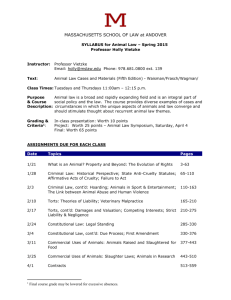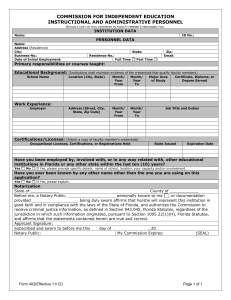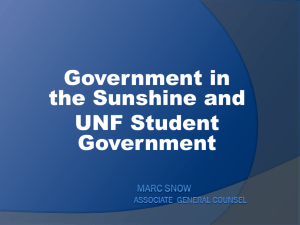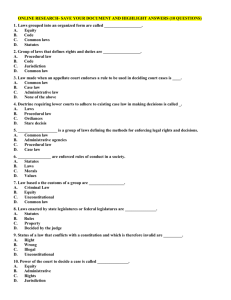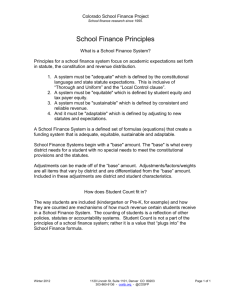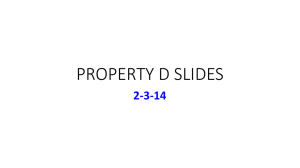tue feb 3 slides
advertisement
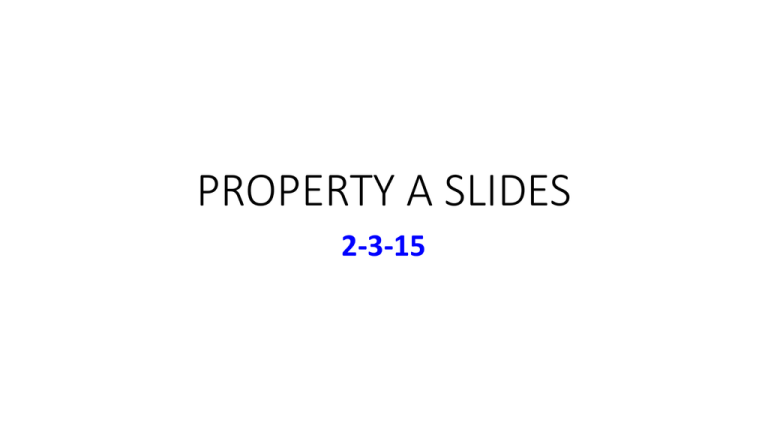
PROPERTY A SLIDES 2-3-15 Tuesday Feb 3 Music: Cyndi Lauper, Twelve Deadly Sins: (1994) Lunch Today (Meet on Bricks @ 11:55): Castillo; Huang; Pierre; Santos; Sued; Tarrash; Usman Office Hours Today Will Start Late (10:20-11:45) I. PROPERTY A (2/3) Logistics & Recap II. Florida MW Statutes (Cont’d) III. Property Open to the Public (Yellowstone) A. Generally B. Brooks IV. Free Speech Rights (Arches) LOGISTICS & RECAP I. Course Page Largely Constructed A. “Syllabus” & “Assignment Sheet”(latter forthcoming) B. DF: Phone # & Weekly Coverage C. Supplemental Materials for Chapter 2 II. Important Dates A. Shortened Jail Days (2/5 & 2/10) B. Make-Up Time: Extendo-Fridays (2/13, 2/27, 3/20, 3/27) 1. Class Meets 7:55-9:45 2. DF Slides to 9:55-10:45 C. Chapter 4 Test: Tuesday 3/24 (Normal Class Time) LOGISTICS & RECAP III.Chapter 1 Review Problems A. Parts of Q4: Issue-Spotter 1. Problem 1K (Part ii)(Thursday)(BISCAYNE) 2. Problem 1K (Part i) (Next Tuesday) (Panels TBA) B. Q2: Short Problems 1. Problem 1C (DF This Week) 2. Additional Short Problem (DF Next Week) C. Parts of Q1: Lawyering 1. Problem 1J (Thursday) (REDWOOD) 2. Problem 1I (Thursday/Friday) (SHENANDOAH) FINAL EXAM QUESTIONS Choose Three of Four • XQ1: LAWYERING • XQ2: SHORT ANSWERS (Choose Three of Four) • XQ3: OPINION/DISSENT • XQ4: TRADITIONAL ISSUE-SPOTTER FINAL EXAM QUESTION 1 “LAWYERING Q” • E.g., Review Problems 1I-1J (each about 1/3 of a 60-Minute Q) • Client Gives You Relatively Brief introduction to Set of Problems (Generally 3-4 Subjects) • Your Job: Create a To Do List of Legal & Factual Research Needed to Advise Client FINAL EXAM QUESTION 1 “LAWYERING Q” Your Job: Create a To Do List of Legal & Factual Research Needed to Advise Client • Don’t Try to Determine Who Wins; By Definition You Have Insufficient Info • Usually Best to Organize by Topic (v. All Legal then All Factual). • Turn Possible Legal Tests into Specific Factual Qs (I’ll demonstrate for “Practical Access to Things MWs Need”) • Client probably wants you to negotiate/settle in addition to or instead of litigating; can ask Qs aimed at creative agreements. FINAL EXAM QUESTION 1 “LAWYERING Q” Your Job: Create a To Do List of Legal & Factual Research Needed to Advise Client • In Grading, I Reward: • Knowing When There Are Multiple Possible Rules (& What They Are) • Imagination: What Relevant Evidence Might There Be? How Would You Find It? (Xmas Lights & Police Records) • Thoroughness & Specific Detail FINAL EXAM QUESTION 1 “LAWYERING Q” Review Problems 1I and 1J Thursday • To help you approach this new set of tasks, I’ve added instructions breaking each problem down into component parts. • These are available on the coursed page on revised pages S17 in the updated version of the Chapter 1 Supplement. Previously in Property A • Right to Exclude & MWs • Shack v. State • Discussed Aspects of Context of Case: • Doctrinal: Comparison to Jacque (DQ1.12) • Structural: Ways for Farmers to Deal With (DQ1.13) • Practiced Applying Case to New Situations • Florida Statutes on MWs • Looked at Content & Operation • Compared to Shack PROPERTY A (2/3) I. Logistics & Recap II. Florida MW Statutes (Cont’d) III. Property Open to the Public (Yellowstone) A. Generally B. Brooks IV. Free Speech Rights (Arches) Florida MW Statutes • DQs 1.19 (b)-(d) (First Names J & D) • DQs 1.19 (e) – (f) (DF Sessions This Week) • Rev. Prob. 1K(ii): (Thursday) (Biscayne) Florida Statutes: DQ1.19 (b) (First Names J & D) 1.19. Under the Florida statutes, can a farm owner exclude any of the following people if not specifically invited by a migrant farmworker (be prepared to identify the specific statutory provision that best resolves the question): (b) The members of the religious group described in DQ1.15(b) on S7. Relevant Statutory Provision is §381.008(6)(c): A representative of a bona fide religious organization who, during the visit, is engaged in the vocation or occupation of a religious professional or worker such as a minister, priest, or nun. Florida Statutes: DQ1.19 (b) (First Names J & D) 1.19. Under the Florida statutes, can a farm owner exclude any of the following people if not specifically invited by a migrant farmworker (be prepared to identify the specific statutory provision that best resolves the question): (b) The members of the religious group described in DQ1.15(b) on S7. §381.008(6)(c): A representative of a bona fide religious organization who, during the visit, is engaged in the vocation or occupation of a religious professional or worker such as a minister, priest, or nun. Florida Statutes: DQ1.19 (b) (First Names J & D) 1.19. Under the Florida statutes, can a farm owner exclude any of the following people if not specifically invited by a migrant farmworker (be prepared to identify the specific statutory provision that best resolves the question): (b) The members of the religious group described in DQ1.15(b) on S7. §381.008(6)(c): A representative of a bona fide religious organization who, during the visit, is engaged in the vocation or occupation of a religious professional or worker such as a minister, priest, or nun. Florida Statutes: DQ1.19(c) (First Names J & D) 1.19. Under the Florida statutes, can a farm owner exclude any of the following people if not specifically invited by a migrant farmworker (be prepared to identify the specific statutory provision that best resolves the question): (c) The teachers from LON described in Review Problem 1A on S8. Florida Statutes: DQ1.19(c/d) (First Names J & D) 1.19. Under the Florida statutes, can a farm owner exclude any of the following people if not specifically invited by a migrant farmworker (be prepared to identify the specific statutory provision that best resolves the question): (c) The teachers from LON described in Rev Prob 1A. If receiving funding under (6)(e). (d) The pizza delivery people described in Rev Prob 1B. Why is (d) a bad question? Florida Statutes: DQ1.19(d) (First Names J & D) 1.19. Under the Florida statutes, can a farm owner exclude any of the following people if not specifically invited by a migrant farmworker (be prepared to identify the specific statutory provision that best resolves the question): (d) The pizza delivery people described in Rev Prob 1B. Bad Question! Pizza delivery people always are invited. Interesting issue: Do they fit w/in following definition?: “Invited guest”—Any person who is invited by a resident to a migrant labor camp or residential migrant housing to visit that resident. Florida Statutes: Review Problem 1K(ii) • From Last Spring’s Final Exam • Part of larger Issue-Spotter • You can see how I edit & present statutes • For Thursday • FF Meet definition of “Other Authorized Guest”? • If he does, or if he’s “Invited Guest,” What Limits OK? • By Manager Sam • By Other MWs • Interesting Q: What does “REASONABLE” mean here? PROPERTY A (2/3) I. Logistics & Recap II. Florida MW Statutes (Cont’d) III. Property Open to the Public (Yellowstone) A. Generally B. Brooks IV. Free Speech Rights (Arches) Right to Exclude: Parcels Open to the Public Coverage 1. Ability to Reject Paying Customers You Don’t Like: “Your Money’s No Good Here.” a) Common Law Rules b) Civil Rights Statutes c) Brooks 2. Later: Right to Exclude v. Exercise of 1st Amdt Rights (JMB & Schmid ) Right to Exclude: Parcels Open to the Public Helpful to See Possible Rules as a Continuum • Can exclude anyone for any reason • Can exclude unless falls within specified forbidden reasons or circumstances. • Must accept anyone who shows up w $$ (unless specific prior harmful conduct). Right to Exclude: Parcels Open to the Public Helpful to Think About Interests ff Parties • Owners’ Interests = • Purpose for Exclusion or Harms from Inclusion • Can help us see viable less restrictive alternatives to complete exclusion. • Interests of Customers & Public = • Purpose for Inclusion or Harms from Exclusion • Can help us see possible permissible limitations on inclusion. Right to Exclude: Parcels Open to the Public Common Law Approaches • Simple Version of Continuum Under Common Law • Can exclude anyone for any reason (Common Law re most businesses) • Must accept anyone who shows up w $$ unless specific prior harmful conduct. (Common Law Innkeeper). • Traditional exceptions to Right to Exclude for necessity & ordinary gov’t operations mostly non-controversial. • We’ll focus on rules triggered by nature of business, like the Innkeeper Rule YELLOWSTONE (DQ1.20-1.23) GIANT GEYSER Right to Exclude: Parcels Open to the Public Innkeeper Rule & DQ1.20 (Yellowstone) Professor Epstein’s explanation for the common law rule that innkeepers and common carriers had to accept all paying customers is that the rule was needed to counteract monopoly power those businesses often had. • Else can charge extra to customers who are stuck (11pm in York) • If limited # of rights to operate business granted by gov’t, services should be available to all Can you think of other possible explanations? Right to Exclude: Parcels Open to the Public Innkeeper Rule & DQ1.20 (Yellowstone) • Professor Epstein: Rule Counteracts Monopoly Power. • Other Possible Explanations Include: • Could View as Moral Duty (See Joseph & Mary) • These services important to state’s commerce & wealth even if no monopoly; want business people to have access Possible costs of this rule to the landowner or to society? Right to Exclude: Parcels Open to the Public Innkeeper Rule & DQ1.20 (Yellowstone) Possible Costs of This Rule Include: • Os lose discretion/personal freedom re customers; can’t exclude do to, e.g., politics or dislike • Possible increased security costs; can’t turn away b/c look sleazy or “feels off” so may need more protection • May raise prices to public Right to Exclude: Parcels Open to the Public Civil Rights Statutes General Operation • They don’t protect specified groups of people, but everyone • Prohibit certain types of decisions made on the basis of specified characteristics like race, sex, religion, disability • E.g., Title II (P85) • Covers decisions about access by listed types of businesses (hotels, restaurants, etc.) • “on the ground of” race, religion or national origin • State Statutes often broader in reach: covering more forbidden characteristics and more types of businesses or transactions Right to Exclude: Parcels Open to the Public Civil Rights Statutes Updated Continuum • Can exclude anyone for any reason (Common Law re most businesses) • Can exclude for any reason except limited list of forbidden characteristics (Civil Rights Statutes) • Must accept anyone who shows up w $$ unless specific prior harmful conduct. (Common Law Innkeeper Rule). Right to Exclude: Parcels Open to the Public Civil Rights Statutes & DQ1.21 (Yellowstone) • What are the justifications for Civil Rights statutes prohibiting discrimination regarding access to public accommodations? • What policy considerations might explain the exceptions to Civil Rights statutes that allow discrimination by private clubs? Right to Exclude: Parcels Open to the Public DQ1.21 Private Club Exceptions to Civil Rights Statutes • Standard Explanation: • Entitled to some relatively private place to meet/assemble where you can exercise a greater right to exclude (e.g., IRA supporters & British) • Avoiding forced association • Cynical Partial Explanation: Congress regularly exempts itself. • Should these exceptions exist? • For many commentators, turns on access to power • Economic; Political; maybe Social • Women gain access to JCs b/c business deals made there • Eating Clubs at Princeton: similar concerns re power PROPERTY A (2/3) I. Logistics & Recap II. Florida MW Statutes (Cont’d) III. Property Open to the Public (Yellowstone) A. Generally B. Brooks IV. Free Speech Rights (Arches) Right to Exclude: Parcels Open to the Public: Brooks Procedural Posture: • US Court of Appeals for 7th Cir (Wisc, Ill, Ind.) • Federal Court b/c Diversity Jurisdiction (P79) • Ps = Pennsylvania Citizens • D = Illinois Corporation • Under Erie, Federal Court applies state law: • Job is to determine what Illinois would do • Court clearly not very sympathetic to D, but not operating on clean slate Questions? Right to Exclude: Parcels Open to the Public Brooks & DQ1.22 (Yellowstone) Purpose of Exclusion & Less Restrictive Alternatives DQ1.22: If their right to exclude is limited, what are the possible harms to the landowners in Brooks? Right to Exclude: Parcels Open to the Public Brooks & DQ1.22 (Yellowstone) Purpose of Exclusion & Less Restrictive Alternatives Possible Harms to O in Brooks Include: • Professional Gamblers = (Maybe) Organized Crime • Reputed presence might discourage others from betting • Actual presence increases risk of actual crime • Expertise + Access to Funds Loss of $$ for O? • Should we treat this potential loss as a significant concern? Right to Exclude: Parcels Open to the Public Brooks & DQ1.23 (Yellowstone) Purpose of Exclusion & Less Restrictive Alternatives Expertise + Access to Funds Possible Loss of $$ for O: Significant Concern? • Could Characterize as • Inevitable Risk of This Business (i.e. “Tough!) –OR• Potential Catastrophic Loss O Should Be Able to Limit • Fact on P79: Ps lost 110 out of 140 betting days: • Why does court include this fact? • Argument that this fact is not very significant?
